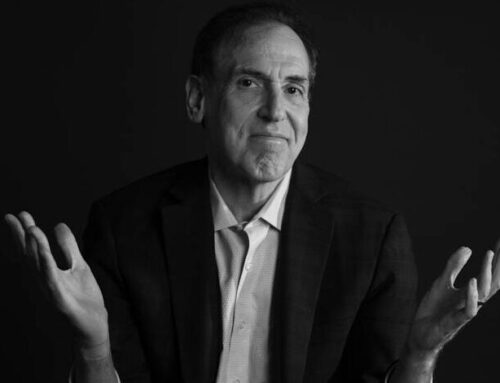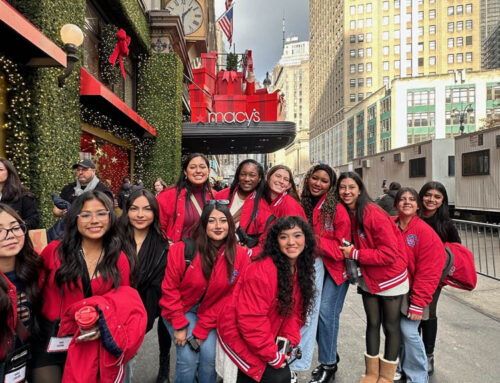
Niki and Dennis McCuistion could see the Tigris and Euphrates rivers through the window of the small, unmarked airplane where they sat. As they neared the land below, a cluster of helicopters approached, and suddenly, the aircraft fell into a death spiral.
“I’m guessing we were avoiding something our pilot deemed dangerous, but we’re not entirely sure to this day,” Dennis says. “That was an interesting introduction to Baghdad.”
That plane ride would be just one of the rattling moments he and Niki would experience while traveling through the Middle East to film “The Roots of War, The Road to Peace”, a documentary about the events leading up to the 9-11 attacks. The once-married duo has spent the past 19 years as the masterminds behind The McCuistion Program, a solutions-oriented discussion show that airs on KERA. Fittingly, it was their work on this TV show that carved the path for the duo to make the documentary.
In fall 2001, Niki produced “Terrorism: Important Information You haven’t Heard Yet,” a segment that aired on The McCuistion Program within in a week of the 9-11 attacks. That work won her the Clarion Award from the Association for Women in Communications. So in 2003, when directors of the Hatton W.Sumner’s Foundation — a primary-funder of The McCuistion Program — wanted to create a documentary about terrorism, they knew just whom to call.
“I, of course, agreed and we began our work,” Niki says. “We didn’t have an agenda, but we did have a focus.”
That focus was on a few select issues: what democracy looks like or could look like in the Middle East, the role women play, the root causes behind 9-11, and possible solutions for peace. The duo enlisted the help of co-editor/lead camera Phil Smith and began their work. Niki and Dennis ultimately spent five years and tens of thousands of their own dollars to complete the project.
Making this documentary, they say, has left them forever changed. Niki recalls one such instance when she and Smith spent Palm Sunday shadowing an Israeli Defense Forces captain who had agreed to take them to see a nearby security fence to keep out Palestine forces.
“A CBS reporter accompanied us on that trip. Our group got to a hill overlooking Bethlehem, and the reporter turned to me and said, ‘Do you mind if we shoot our video first? We just need a sound bite.’ It was one of the most decisive issues at that time, and all he needed was a sound bite.”
“That incident changed my life. Most of what’s on TV is just a sound bite: It’s tantalizing and interesting, but not the complete story.
“I want people to hear all the sides and make up their own minds. We don’t expect the average person to do all the research and travel like we do, but one ought to know more about the big picture. Americans owe it to their country and the world to be informed. Democracy requires informed citizens.”
The documentary is chock full of gripping images and insightful interviews with government officials, academics, clergy and more — but what viewers don’t get to see is what went into getting that footage, a process that proved to be risky on more than one occasion.
Like the time Dennis and Niki were walking the streets in Palestine when they heard a booming ruckus.
“I thought, ‘Isn’t that wonderful … fireworks,’” Dennis recalls. “We were too stupid to be afraid.”
Too stupid, he says, because that commotion had actually been a bomb detonating, which destroyed three city blocks.
“It made the gravity of our situation very, very real,” he says.
Or, there was the time they were driving around a Baghdad airport heading to an interview.
“There were no signs posted anywhere, deliberately,” Niki explains.
So their driver understandably got a little turned around. But when he started following a black SUV with dark tinted windows a little too closely, things took a dangerous turn.
“All of a sudden, [the SUV] stops and the men who were riding in it get out with their guns pointed at us. It was like what you see in the movies,” Niki says.
Those men, they would later learn, were CIA agents. They had stopped Niki and Dennis’s car because their driver had accidently started following them down the road that led to where Saddam Hussein was being held captive.
Niki’s treatment as a woman traveling in the Middle East also was an eye-opening experience.
“Saudi Arabia is not an easy country for U.S. women. It never occurred to me I couldn’t put on modest clothes and go jogging,” Niki says. “There were parts of our hotel I couldn’t go into without a man. At one point, we needed a quiet room because we were tapping interviews. The hotel staff interrupted us because it was against policy for a woman to be alone in a room with that many men.
“From a journalism perspective, it was very interesting. If I hadn’t wanted to experience so much of the culture, I would have been irritated. But all I could say was, ‘Isn’t this interesting?’”
She recalls a female journalist with a doctorate degree who had to be escorted to a parent-teacher conference by her 6-year-old son because her husband was out of town, and going without a male escort was not allowed.
“We have no idea how free we are in this country,” Niki says.
Ultimately, they hope the documentary serves to educate and inspire viewers to find out more. This, Niki says, is the first step towards peace.
“If we understand other people’s objective and how they think,” she says, “we can work toward peace; we can come up with a solution.”
Find more information, or to order a copy of the documentary, visit therootsofwar.com.






